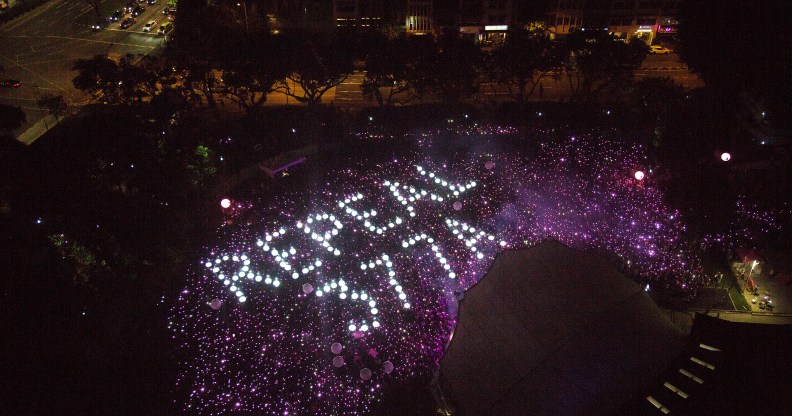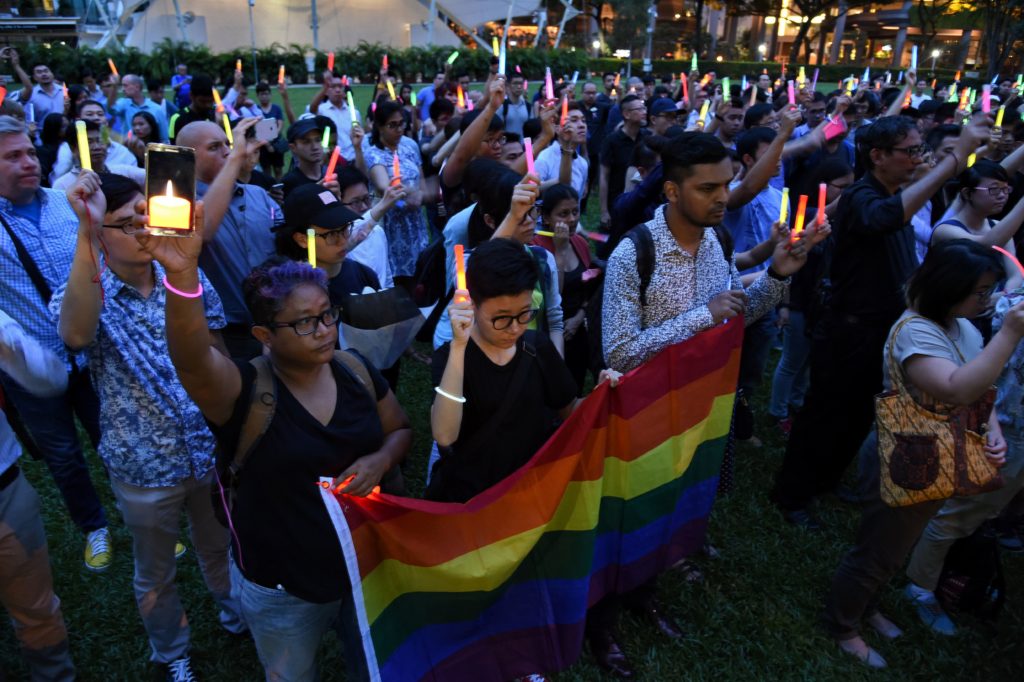Singapore’s colonial-era gay sex ban to face first of three high court legal challenges

LGBT+ advocates form the words ‘Repeal 377A’ in Singapore on June 29, 2019. (Ore Huiying/Getty)
Tomorrow the high court in Singapore will hear the first arguments to overturn Section 377A, a colonial-era law that criminalises gay sex.
Singapore’s strict penal code classes sex between men as an act of “gross indecency” punishable by up to two years in prison, although prosecutions are rare. The law doesn’t apply to sex between women.
Three Singaporean activists have launched three separate challenges against the outdated law – Roy Tan, a former organiser of the Pink Dot gay rally, Johnson Ong Ming, a DJ, and Bryan Choong, a former leader of the non-profit organisation Oogachaga.
The trio are arguing that Section 377A infringes on privacy, the right to life and personal liberty, both of which are protected by the constitution.
“I think public opinion is pretty clear across religious and age segments that homosexuality should not be a criminal offence,” Ong Ming, the first to launch a challenge, told the Thomson Reuters Foundation.
“I have full confidence in our judicial system and I am hopeful that the court will come to the right decision… and overturn Section 377A.”
Ong Ming is optimistic but the cases are expected to polarise the island city-state, which remains socially conservative.
While the majority of Singaporeans aged under 24 back LGBT+ rights, older generations are less tolerant, with a September 2018 poll finding that 55 percent of Singaporeans still support Section 377A.
Just 12 percent said they wanted it repealed, and 33 percent were undecided.
A previous legal challenge to overturn the ban failed in 2014, and in June this year, Singapore’s prime minister Lee Hsien Loong reiterated that Singapore would keep Section 377A “for some time”.

Singaporeans holding a vigil for the victims of the mass shooting in Florida’s Pulse gay nightclub (ROSLAN RAHMAN/AFP/Getty)
“Whatever your sexuality orientation is, you’re welcome to come and work in Singapore … [but] you know our rules in Singapore. It is the way this society is: We are not like San Francisco, neither are we like some countries in the Middle East. [We are] something in between, it is the way the society is,” he said.
But activists are empowered by the recent decriminalisation of homosexuality in India, another former British colony. The landmark ruling in 2018 led to more than 50,000 Singaporeans signing a petition entitled ‘READY4REPEAL‘, urging their government to follow suit.
“How much longer must gay Singaporeans live as second class citizens; branded criminals by laws meant to protect all Singaporeans?” the petition asked.
“We are ready for a Singapore that treats all her citizens equally. We are ready for a Singapore that respects its minorities and promotes individual choice and dignity. We are ready for a Singapore where people are not afraid to simply be who they are.”
The court has set aside six days for the legal challenges against Section 377A to be heard.

